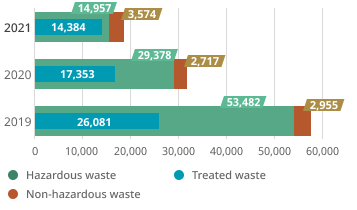Sustainability
- Home
- /
- Sustainability
- /
- Managing waste
Waste management
Waste handling in KPO is focused on reducing the real and potential hazards the generated waste may impose on people and the environment. Our targets are to treat and recycle waste at our facilities, to cut down amount of transfer to landfills, to reduce negative impact from burials, as well as to research explore and apply new methods and technologies.
Measures taken by KPO to reduce the volume of generated waste, the Ventures’ compliance with environmental safety rules during accumulation and storage, collection and transportation, segregation, reuse, recycling and reduction of volumes and hazardous properties of wastes, as well as environmentally friendly burial — all this enables to significantly mitigate the adverse impact on people and the environment.
The KPO Waste Management Programme for 2021-2023 provides indicators and measures to reduce gradually the accumulated and generated waste volumes and level of hazardous properties.
The Company applies the following waste management methods:
- waste recovery to process stream;
- waste treatment at the Eco Centre facilities;
- waste burial at the Eco Centre facilities;
- waste handover to specialized contractor organizations for further disposal, processing and destruction.
In 2021, the volume of waste generated at KPO facilities totalled 19,660 tonnes. Compared to 2020 this shows a decrease by 13,518 tonnes, which was mainly due to the reduction of the drilling programme and the shutdown of the rotary kiln incinerator for repair. The graph below shows all types of waste generated in KPO.
According to the Unified republican form of the waste information reporting system, the total volume of waste generated inс2021 included both waste generated and waste after its treatment.
Waste generated at KPO facilities in 2019 — 2021, tonnes

Note: The domestic waste are not accounted for in this calculation due to their insignificant quantity (below 6%) compared to the production waste. The domestic waste is described further in the text in the waste handling methods table.
Spills
In 2021, no any significant spill was recorded at the territory of the Karachaganak field.
The definition of a significant spill is applied to an incident, which has caused contamination of the environment through hydrocarbon/chemical spills to land or water and volume of spilled hydrocarbon/chemical exceeding 1,000 litres (as per KPO Incident classification).




